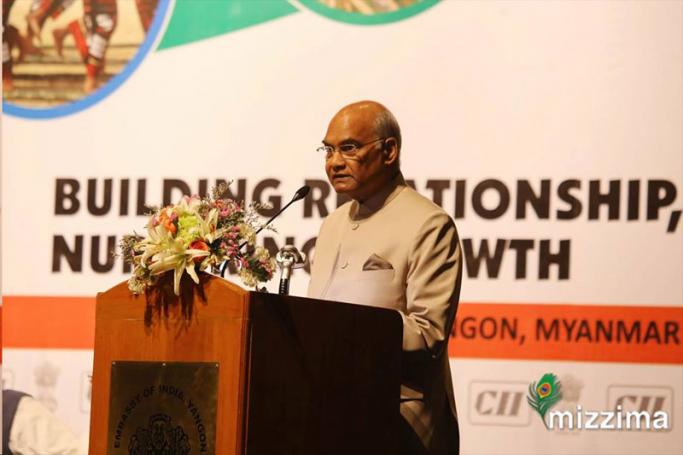The President of the Republic of India, HE Shri Ram Nath Kovind and the First Lady Smt. Savita Kovind paid a State Visit to Myanmar from 10 to 14 December 2018, resulting in a wide range of issues being discussed and a number of MoUs being signed.
President U Win Myint and President Kovind held a bilateral meeting and President U Win Myint hosted a State Banquet for the visiting President in his honour. President Kovind also met with State Counsellor, Her Excellency Daw Aung San Suu Kyi. President U Win Myint and President Kovind witnessed the signing of a MoU between the two sides in the areas of judicial and educational cooperation. The Indian side also handed over the first 50 units of prefabricated houses built in Rakhine State under the Rakhine State Development Programme funded by the Government of India. Furthermore, both sides agreed to sign at the earliest the MoU for Cooperation on Combating Timber Trafficking and Conservation of Tigers and Other Wildlife and the MoU on Bilateral Cooperation for Prevention of Trafficking in Persons; Rescue, Recovery, Repatriation and Re-integration of Victims of Trafficking, on which negotiations are nearing completion.
On 12 December 2018, President Kovind visited the Advanced Centre for Agricultural Research and Education and the Rice Bio Park that have been set up with the assistance of Indian Government in the precincts of Yezin Agricultural University. Both the facilities were formally dedicated by President Kovind to the people of Myanmar. They demonstrate continuing commitment of India to assist Myanmar in capacity building and providing technical assistance in the all-important agriculture sector.
President Kovind also travelled to Yangon where he visited places of historical and cultural importance and paid his respects at the Martyrs' Mausoleum. He met with the Indian-origin and expatriate Indian community of Myanmar and also inaugurated the Enterprise India Show, which witnessed the participation of Indian industries to network, partner and explores business opportunities in Myanmar.
During the talks, the leaders of the two countries reaffirmed their common aspiration for peace, collective prosperity and development of the region and beyond. They reviewed developments since the visits of Prime Minister Narendra Modi to Myanmar in September 2017 and State Counsellor Daw Aung San Suu Kyi to India in January 2018 and noted the growing exchanges in the bilateral sphere, including in the areas of trade, investment, culture, people-to-people contacts and security that bear testimony to the synergies between Myanmar's independent, active and non-aligned foreign policy and India's pragmatic Act East and Neighbourhood First policies. The leaders agreed to continue exploring new opportunities to expand bilateral relations for the mutual benefit of the peoples of both countries.
The Government of India appreciated the Government of Myanmar’s announcement to grant Tourist Visa on Arrival, starting from 1 December 2018, to Indian citizens who intend to visit Myanmar. This will promote people to people ties and increase the flow of tourists between the two countries. The Government of Myanmar also thanked the Government of India for according gratis visa for all Myanmar citizens visiting India.
President Kovind appreciated Myanmar Government’s ongoing efforts toward achieving peace and national reconciliation in the country. He expressed full support of the Government of India to the on-going peace process being pursued with various ethnic armed organizations. He underlined that peace and stability in Myanmar are equally in India's own interest and that India stands committed to helping Myanmar strengthen democratic institutions and emerge as a democratic federal union. In this regard, Myanmar expressed its appreciation to India for the exposure visits being arranged by India for parliamentarians and parliamentary personnel from Myanmar.
The leaders agreed that terrorism constitutes a significant threat to peace and stability in the region and should be confronted in all its forms and manifestations. They called on the international community to end selective and partial approaches to combating terrorism and, in this regard, jointly called for the expeditious finalization and adoption of a Comprehensive Convention on International Terrorism by the United Nations General Assembly.












